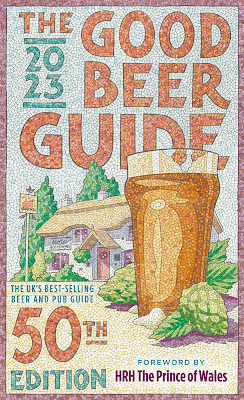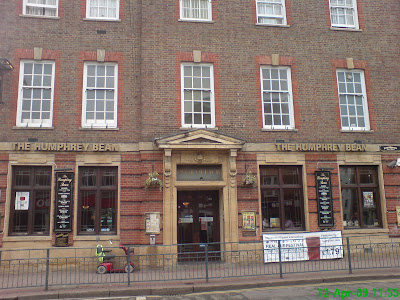This is an article I've not only been meaning to write for a long time, it’s also one that has taken rather a lot of man hours to write and complete. It's a post about our old friends JD Wetherspoon, the well-known and highly successful pub chain who have outlets the length and breadth of the UK, but at the same time somehow manage to attract controversy. I first became aware of Wetherspoons pubs back in the early 1980’s, and primarily through entries in CAMRA’s Good Beer Guide, as well as local guides. At the time they were primarily a London-based operation, which often traded under the name JJ Moon's. Today of course they are a national chain with a reputation for taking on old buildings such banks, cinemas, theatres, and shops and converting them into pleasant places in which to drink. From the word go Wetherspoons pubs have always sold cask ale, although initially the beers stocked were mainly nationally known brands, such as Courage Directors, Greene King Abbot and Youngers Scotch Bitter - whatever happened to that? The pubs later became much more adventurous with the beers they sold, and today the line-up on the bar will often include a selection of locally brewed cask ales. Many outlets offer special promotions, of even “meet the brewer” evenings, and the entire group takes part in the beer festivals (two per year), that are a major feature of JDW. Today the company operates getting on for 900 pubs spread across the length and breadth of the United Kingdom. There are also a handful of outlets across the Irish Sea, on both sides of the border between the Irish Republic and Northern Ireland. The vast majority of Wetherspoons outlets, or "Spoons" as they are often known, were not previously pubs but involve conversions of buildings that previously had other uses. Included here are premises such as shops, cinemas, theatres. Some are so large they are often referred to as drinking barns. Unkindly, perhaps, but there is probably more than a grain of truth in this description. Whatever their origin, Wetherspoons outlets are hugely popular, and attract a large number of devoted fans. They offer cheap beer, often at a pound cheaper per pint, than competing pubs. As we have already seen, they stock a good range of cask ales, keeping and serving them in first class condition. It is perhaps little wonder then that, 200 Wetherspoons pubs feature in the current (2023) CAMRA Good Beer Guide. All Wetherspoons outlets offer a range of cheap meal options, with various price promotions available at different times, and on different days. Their Thursday night, Curry Club has become something of a national institution, and Spoons was always a good fallback position for a cheap breakfast. For those who prefer not to have their eardrums blasted, by recorded music of any genre, JDW provide a quiet atmosphere in which to enjoy a few drinks, and a chat with friends, family, or both. More importantly, they provide a safe, non-threatening and secure environment in which to do so.
I used to be a fan, especially during the group’s early days, often making a point of visiting different JDW pubs in other parts of the country. I even attended an appeal hearing at Maidstone Crown Court in support of Wetherspoons, who were planning to open a new pub, in Tonbridge, the town I have resided in since the mid-1980’s. The appeal was successful, the court granted JDW their licence, and several months later the Humphrey Bean opened it doors, in Tonbridge’s former main Post Office building.
A decade or so later, I attended the 2010 CAMRA National AGM, which took place on the Isle of Man. One of the key motions for debate was one which sought to restrict, or even remove the link between CAMRA and Wetherspoon’s whereby vouchers are issued to members in order to obtain a discounted a pint of beer. I thought at the time that removing this incentive would alienate the younger members of campaign. There were a substantial number of cash-strapped students amongst this group, many of whom were probably attracted to join CAMRA because of the Wetherspoons voucher offer. The motion was defeated, and the voucher scheme continued, but I do remember former CAMRA national chairman Chris Holmes, who at the time ran the highly successful Castle Rock Brewery in Nottingham, speaking out against what he viewed as unfair competition from Wetherspoons. He claimed that CAMRA’s role in supporting these vouchers, and the discounted pints they offered, compromised the group’s impartiality. Despite this claim, I voted against this motion, but with hindsight, I feel I was wrong.It probably wasn't that long afterwards that my opinion, and views of the chain began to change. Initially, this was due to the way that JDW operated their pubs, with particular reference to the shortage of staff behind the bar, the lack of people collecting empty glasses and plates, coupled with not cleaning the tables. Plates of half-eaten food, badly stacked glasses, and sticky marks on the tables, didn't help with either, and whilst I’m sure none of this was intentional, it tends to point at not employing sufficient staff.
I’m well aware that staffing costs are amongst the highest overheads, for any business, and running the pubs on low cost basis, allows JDW to knock out beer and food at bargain basement prices, but there has to be a happy medium. There is also the issue of a hard core of drinkers who are in there from the off, necking back pints of Stella from 9am onwards. This is not a normal lifestyle by any stretch of the imagination, and whilst not wishing to come across as judgmental, the “beer for breakfast” brigade can sometimes be loud, or even leery, depending on how much they’ve already consumed. I remember being asked by one such individual if I could lend him a fiver. I had considered reporting him to the pub’s management, but the fact he didn’t grasp the concept behind the word “loan” was enough to get rid of him, especially when I asked when he’d be able to pay me back!An isolated incident, perhaps but sadly not, as I can relate several other similar instances. Annoying as the above issues are, especially when combined with a lack of staff, it was the decision by Wetherspoon’s founder, chairman and chief executive Tim Martin, to throw his weight behind the Leave Campaign, during the 2016 EU referendum campaign, that persuaded me that I didn’t want to drink in his pubs anymore. It wasn’t a sudden decision, despite Mr Martin being one of the few British business leaders to back Brexit, it was a case of him not knowing when to stop.
There were the photo opportunities with the likes of Nigel Farage and Boris Johnson, both serial fantasists, and in Johnson’s case, a serial liar, as well, but the final straw for me, came with Tim Martin’s Twitter announcement that, “We've placed 500,000 beer mats in our pubs with a hard-hitting message on Brexit to parliament”. Martin was not just pushing a damaging, no-deal Brexit, but calling for a total boycott of European goods and services. (Where did he think Stella came from?) This was back in the late autumn of 2017, and I responded with a boycott of my own, writing in a blog post, “As a direct result of Tim Martin’s xenophobic, anti-European rhetoric, I will no longer be spending my hard-earned cash in any of his establishments. I have already destroyed my Spoon’s vouchers, and after 45 years membership, I will also seriously consider whether I wish to remain a member of CAMRA.” Five and a half years later, I relented, partially to see whether anything had changed within JDW, but also because I was trying, unsuccessfully as it happened, to find a pub offering reasonably priced, lunchtime food in Henley on Thames. The Wetherspoon’s-owned, Catherine Wheel, came up trumps, as reported in the previous article, although this lavishly restored hotel, in upmarket Henley on Thames, hardly compares with your local JDW outlet in a so-called former “Red Wall” town such as Scunthorpe or Whitehaven.
Tim Martin’s support for Brexit has already come back to haunt him, especially when it comes to recruiting and retaining staff. The poisonous rhetoric, directed at our European neighbours by many Vote Leave supporters, was sufficient to persuade many workers from the EU that they were no longer welcome in Britain. This view was reinforced by many Brexit supporters, who were of the opinion that these people from eastern Europe were over here, occupying much of the available social housing and pinching their jobs as well. It was irrelevant that the jobs they were referring to were the sort that your average, Sun-reading loafer had no intention of applying for themselves. Profits at JDW took a tumble, although the damage caused by a succession of Covid lockdowns, rising interest rates, and supply chain issues was largely responsible for this. Problems in obtaining goods has been exasperated by the government’s ludicrous decision to take the UK out of both the Customs Union and European Single Market, thereby creating barriers to trade, where none had existed before. There was no mention of this prior to the referendum, although there were claims that Brexit would remove EU red tape – yeah, right!
We now have a situation where many who voted leave now regret that decision, and many MPs on both sides of Parliament, believe that leaving the Customs Union and Single Market, was a grave mistake. They won’t admit that in public, of course, for risk of upsetting the dwindling numbers of Brexit supporters that abound up and down the country, but the tide is slowly turning against this decision, despite the best efforts of the Express, the Mail and the Torygraph.
Tim Martin too has become very quiet, possibly because he is now concentrating on his business, rather than right-wing politics. So whilst I have now dropped my rigid boycott of Spoons, I shall still look on them as "any port in a storm," so to speak. Instead, I will continue directing my support towards independently owned pubs, or those run by small breweries such as Harvey’s, Hook Norton, Adnams etc. - places that are run by local people for the benefit of local people.
The final word goes to Wetherspoons, as there is no doubt that Tim Martin is an extremely successful businessman, who has taken the traditional pub model, kept the best bits and then turned the rest of it on its head. Since their founding 40 years ago, JWD have become a national institution and part of the British psyche. Love them or loathe them, they are not going away, so it will be interesting to see how the group progresses from here.




























